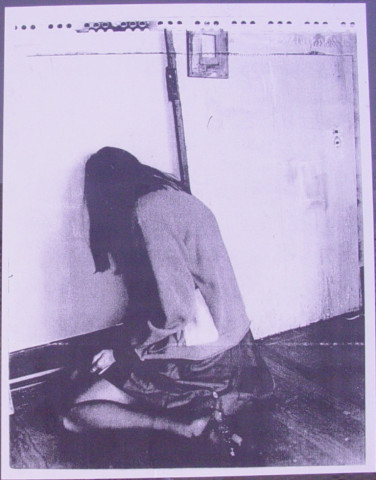Maid's story of torture shines light on India slave labour
Girl says she was beaten with belts, brooms and chains while locked in the home where she was hired to work as a maid.

Girl says she was beaten with belts, brooms and chains while locked in the home where she was hired to work as a maid. PHOTO: FILE
"She would pull my hair out, violently hit me over the head... most of the times she got angry out of the blue," the 18-year-old told AFP, as she recovered in a New Delhi hospital.
The girl says she was beaten with belts, brooms and chains while locked in the home where she was hired to work as a maid in an upscale neighbourhood in the capital.
"She wouldn't give me any money, make any phone calls, interact with anyone. She ripped all my papers that had phone numbers (of her relatives) into bits," said the girl, whose left cheek and chest are covered in scars.
Her story made headlines this month after she was rescued by police and social rights campaigners who said she had been slashed with knives and bitten by dogs.
The case is far from unique in a country home to almost half of the world's slave population. A report released this week called the Global Slavery Index found an estimated 13.95 million people in India are victims of forced labour.
"People are controlled by violence," said Nick Grono, chief executive of the Walk Free Foundation, which published the report.
"They are tricked or they are forced into jobs or situations where they are economically exploited. They live on no pay or base subsistence pay and they're not free to leave."
The girl, who only completed three years of school, came to the teeming capital from the impoverished eastern state of Jharkhand searching for work to send money back home.
The teenager, who cannot be named for legal reasons, worked in several homes before a maid agency placed her with her current employer, who was arrested and has denied charges of abuse. The case is still before the courts.
In India, mainly women are trafficked, coerced or tricked into different forms of slavery ranging from domestic service to prostitution and forced marriages. Desperately poor parents also sell their children, who are then forced into begging rackets, sexual exploitation and manual labour such as working in coal mines, according to other experts.
Still more are kidnapped and brought to Delhi, according to the UN's Office on Drugs and Crime (UNDOC).
"Delhi is a destination and transit point for victims" trafficked from throughout India as well as neighbouring Nepal and Bangladesh, a UNDOC report released in July said.
The report warned that trafficking in the capital, in particular, was worsening, with criminal gangs expanding their operations by disguising them as businesses such as placement agencies and massage parlours.
Weeks after her daughter was snatched from a village in a remote corner of India, Rabia Bibi found herself in the seedy backstreets of Delhi.
With no money and little knowledge of life outside her village, Bibi travelled to the capital in a desperate bid to find her. For weeks she shadowed police during raids on the city's squalid hotels.
Bibi said she had little choice after 17-year-old Ranoo, her youngest of nine children, disappeared without trace on her way to buy food in West Bengal.
"Three fishermen saw my daughter screaming inside a speeding car," said Bibi, offering AFP what little information she had about the kidnapping.
Navin Haro, a poor labourer, had been equally determined to find his daughter, 13-year-old Jyoti Mariam. She was taken in broad daylight earlier this year from their village in Chhattisgarh state as she returned from school.
According to the National Crime Records Bureau, some 38,200 women and children were reported kidnapped last year in India, compared with 35,500 the year before. Rights groups say the actual number is probably much higher.
For Bibi, each police raid brought more despair, as officers rescued girls with a similar age as her daughter, but never her own.
Although both girls were victims of trafficking, their fates turned out to be very different. Ranoo was finally found weeping but alive by police, locked in a shabby hotel room.
Haro, however, discovered Mariam's body about one week after she went missing, wrapped in plastic, in a hospital morgue.
"I lost my daughter because I had no money to even trace her," Haro said, as he prepared to bury his daughter in a Christian cemetery.
"Tell me: how would I have traced her in this big country?"
Mariam's official cause of death was listed as malaria, giving police little incentive to treat her case as a criminal one and find her kidnappers.
Armed with laws against trafficking and slavery, police are arresting those behind such rackets, but experts say more coordinated action is needed.
"The crime knows no jurisdiction, it knows no borders between one country and another or one state and another state," said Bhamati, who has worked for the federal government to develop anti-trafficking policies.
Shakti Vahini (Power Brigade), an organisation working with police to rescue victims, says India's recent economic growth has fuelled the problem.
"Rich people are willing to pay any amount of money to get servants who can clean their houses, survive on left-over food," said the organisation's Rishi Kant.
"Illegal placement agencies offering house maids have mushroomed in every city across India."
For the 18-year-old rescued in Delhi, life should slowly return to normal. Her mother travelled to the capital and planned to take care of her at home.
"I'll put her back in school again," the mother told AFP. "There is no need to do this kind of work."



















COMMENTS
Comments are moderated and generally will be posted if they are on-topic and not abusive.
For more information, please see our Comments FAQ